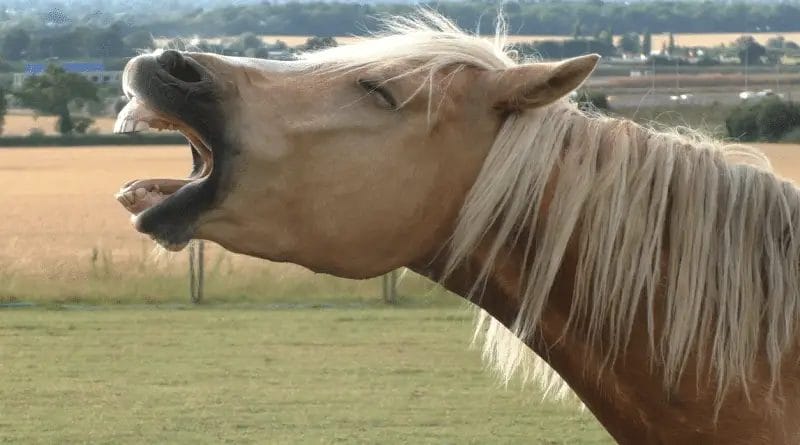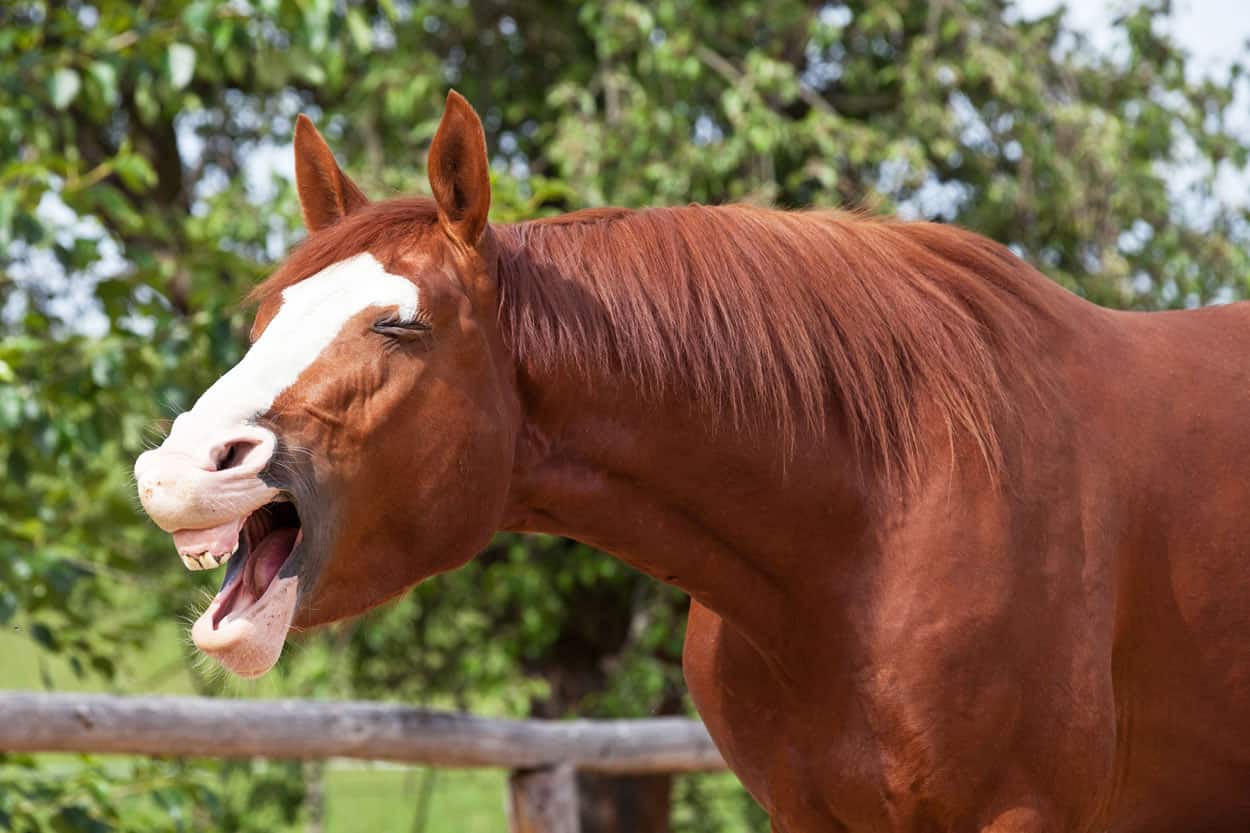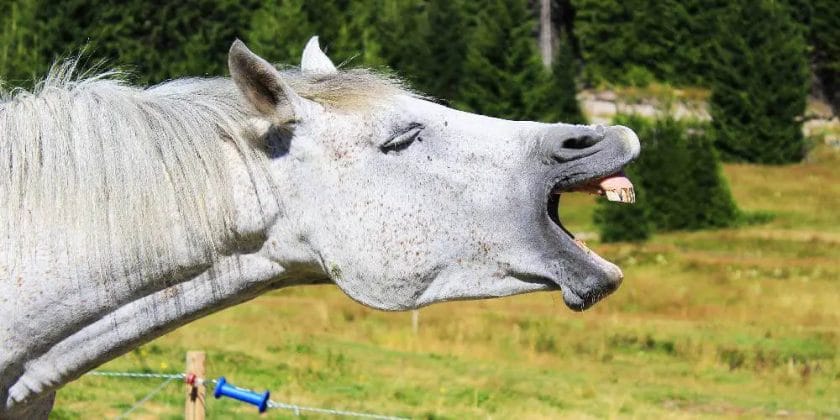Yes, horses do yawn, just like humans and other animals. Yawning in horses serves as a way to release tension and stretch their jaw muscles. It can also be a sign of fatigue or boredom. While the exact reasons behind horse yawning are not fully understood, it is a natural and common behavior among these majestic creatures.

Common Misconceptions About Horses Yawning Debunked
Yawning is a behavior observed in many different animals, including horses. However, there are several common misconceptions about why horses yawn and what it means. In this section, we will debunk some of these misconceptions and provide a clearer understanding of why horses yawn.
1. Horses yawn only when they are tired or bored.
Contrary to popular belief, horses do not yawn solely when they are tired or bored. While yawning can be observed in these situations, it is not the only reason horses yawn. Yawning in horses can also be a response to stress, excitement, or even as a form of communication.
In fact, research has shown that horses may yawn as a way to release tension and relax. It can be a self-soothing mechanism that helps them cope with various emotions and situations. So, the next time you see a horse yawn, don’t jump to conclusions about its state of tiredness or boredom.
2. Horses yawn to take in more oxygen.
Another common misconception is that horses yawn to take in more oxygen. While yawning does involve a deep inhalation of breath, it is not primarily done to increase oxygen intake. In fact, horses already have a highly efficient respiratory system that allows them to take in sufficient oxygen through regular breathing.
The true purpose of yawning in horses is not fully understood, but it is believed to be more related to relaxation and communication rather than oxygen intake. Yawning may help horses regulate their body temperature, release tension, and signal social cues to other horses.
3. Horses yawn as a sign of illness.
Some people mistakenly associate yawning in horses with illness or discomfort. However, yawning alone is not a reliable indicator of a horse’s health. It is essential to consider other signs and symptoms when assessing a horse’s well-being.
If a horse is frequently yawning along with other concerning symptoms such as lethargy, loss of appetite, or abnormal behavior, it may indicate an underlying health issue. In such cases, it is recommended to consult a veterinarian for a thorough examination and diagnosis.
4. Yawning in horses can be contagious.
Contagious yawning, where one person yawns and triggers others to yawn as well, is a well-known phenomenon. However, it is still unclear whether contagious yawning occurs in horses. While it has been observed in some social animals like primates, dogs, and even birds, research on contagious yawning in horses is limited.
Some studies suggest that horses may exhibit contagious yawning, especially when they are in close proximity to familiar companions. However, more research is needed to fully understand this behavior and its social implications in horses.
5. Yawning in horses is always a cause for concern.
Lastly, it is important to note that yawning in horses is not always a cause for concern. As mentioned earlier, yawning can be a normal behavior associated with relaxation, stress release, or communication. It is a natural part of a horse’s repertoire of behaviors.
However, if you notice any sudden or significant changes in a horse’s yawning behavior, such as excessive yawning or accompanied by other unusual symptoms, it is advisable to consult a veterinarian. They will be able to assess the situation and determine if any further action is necessary.
Summary
In summary, yawning in horses is a complex behavior that serves various purposes. It is not solely related to tiredness or boredom but can also be a response to stress, excitement, or a means of communication. Yawning does not primarily serve to increase oxygen intake but may help horses relax and release tension. It is not always a sign of illness, although changes in yawning behavior should be monitored. Whether contagious yawning occurs in horses is still uncertain. Understanding these misconceptions about yawning in horses enables us to have a better comprehension of this intriguing behavior.

Yawning in Horses: A Sign of Fatigue or Something Else?
Yawning is a common behavior observed in various animals, including horses. It is often associated with fatigue in humans, but what about horses? Is yawning in horses a sign of tiredness or could it indicate something else? In this section, we will explore the phenomenon of yawning in horses and delve into its possible meanings.
Contrary to popular belief, yawning in horses may not necessarily indicate fatigue. While yawning is commonly observed in horses during periods of rest or sleep, it can also occur during various other situations. One possible explanation is that yawning in horses serves as a way to communicate or express certain emotions.
Studies have shown that horses may yawn in response to stress or anxiety. It could be a way for them to release tension or cope with a challenging situation. For example, a horse that is nervous before a competition or in a new environment may yawn as a means of self-soothing. Similarly, a horse that is feeling frustrated or bored may yawn as a form of emotional release.
Another interesting aspect of yawning in horses is its contagious nature. Just like humans, horses can “catch” yawns from each other. This phenomenon has been observed in various species and is believed to be linked to social bonding. Yawning can serve as a way for horses to synchronize their behavior and establish a sense of unity within a group.
In addition to emotional expression and social bonding, yawning in horses may also have physiological significance. Some researchers suggest that yawning helps to regulate brain temperature and increase oxygen intake. It is believed to enhance brain function and promote alertness. Therefore, yawning in horses may serve as a mechanism to maintain optimal brain function and overall well-being.
It is worth noting that excessive yawning in horses could be a cause for concern. If a horse is yawning excessively and showing other signs of discomfort or illness, it is advisable to consult a veterinarian. Excessive yawning, along with other symptoms, could be indicative of underlying health issues that require medical attention.
In summary, yawning in horses is a complex behavior that goes beyond simple fatigue. While it can occur during periods of rest or sleep, yawning in horses may also serve as a means of emotional expression, social bonding, and physiological regulation. It is important for horse owners and handlers to understand the various contexts in which yawning can occur and to monitor for any excessive or abnormal yawning that may indicate underlying health concerns.

The Social Aspect of Horses Yawning: Communication or Contagious?
Yawning is a universal phenomenon that is not limited to humans. It is observed in many animals, including horses. While yawning has long been associated with fatigue or boredom, recent studies have shed light on its potential social significance in horses. This article delves into the social aspect of horses yawning, exploring whether it is a form of communication or merely contagious behavior.
Yawning as a Communication Tool
Researchers have proposed the idea that yawning in horses may serve as a means of communication within their social groups. Horses are highly social animals and rely on various non-verbal cues to interact with one another. Yawning, in this context, may serve as a visual signal to convey important information.
One hypothesis suggests that yawning may be a way for horses to communicate relaxation or contentment to their herd members. It is believed that a horse yawning in the presence of others may indicate a sense of security and trust, reassuring the rest of the group.
Moreover, yawning in horses has been observed to occur more frequently during moments of social bonding and affiliative behaviors, such as grooming sessions. This further supports the idea that yawning may serve as a form of social communication among horses.
The Contagious Nature of Yawning
On the other hand, yawning in horses could simply be a contagious behavior, similar to how humans often yawn when they see others yawning. Contagious yawning is a well-documented phenomenon in various vertebrate species, including primates, dogs, and even birds.
Some researchers argue that contagious yawning in horses is a result of their strong social bonds and empathetic abilities. It is believed that horses may yawn in response to seeing another horse yawn as a form of mimicry or empathy. This contagious yawning behavior could help strengthen social bonds within the group.
However, it is important to note that not all horses exhibit contagious yawning. Some individuals may be more susceptible to contagious yawning than others, suggesting that there might be individual differences in how horses perceive and respond to yawning stimuli.
The Role of Additional Factors
While the debate continues regarding the social aspect of horses yawning, it is essential to consider other factors that may influence yawning behavior in horses.
Stress and arousal levels have been found to be associated with yawning in horses. It has been observed that horses may yawn more frequently when they are in unfamiliar or stressful situations. Yawning in these instances may serve as a self-calming mechanism to alleviate anxiety.
Furthermore, physiological factors such as sleep deprivation, hunger, or physical discomfort can also influence yawning behavior in horses. These factors should be taken into account when interpreting the social significance of yawning in horses.
In Summary
The social aspect of horses yawning remains a fascinating topic of research. While some studies support the idea that yawning is a form of communication, others argue that it is simply a contagious behavior. It is likely that yawning in horses serves a combination of these functions, depending on the context and individual differences. Additional research is needed to unravel the complexities of yawning in horses and its role in their social dynamics.
Understanding the Frequency of Horses Yawning: What’s Normal and What’s Not
Yawning is a common behavior observed in horses, just like in humans and other animals. It is often associated with tiredness or boredom, but it can also serve as a way for horses to communicate and release tension. In this section, we will explore the frequency of horses yawning, what is considered normal, and when it might indicate an underlying issue.
Normal Yawning Frequency in Horses
Yawning is a natural occurrence in horses and can happen at any time of the day. On average, a horse may yawn a few times a day, typically after waking up from sleep or a period of rest. This is considered normal behavior and is no cause for concern.
It is important to note that the frequency of yawning can vary among individual horses. Some horses may yawn more frequently than others, while some may rarely yawn at all. This is influenced by various factors such as age, health, and environmental conditions.
Factors Influencing Yawning in Horses
1. Sleep and Rest: Horses are more likely to yawn after periods of sleep or rest. This is similar to how humans yawn after waking up or when feeling tired. Yawning helps the horse to stretch its jaw muscles and increase oxygen intake.
2. Boredom and Stress: Horses may also yawn as a response to boredom or stress. Yawning in these situations serves as a self-soothing mechanism, helping the horse to release tension and cope with the situation.
3. Social Interaction: Yawning can be contagious among horses. When one horse yawns, it may trigger a yawning response in nearby horses. This is believed to be a form of social bonding and communication among the herd.
When Yawning Raises Concern
While yawning is generally a normal behavior in horses, there are instances where excessive or unusual yawning may indicate an underlying issue. It is important for horse owners and caretakers to be aware of these warning signs:
1. Excessive Yawning: If a horse is yawning excessively throughout the day, it may be a sign of discomfort or pain. It could indicate dental problems, gastrointestinal issues, or respiratory conditions. Consulting a veterinarian is recommended to investigate the cause.
2. Changes in Yawning Behavior: If a horse suddenly starts yawning more frequently or stops yawning altogether, it may indicate a change in their health or well-being. This could be a sign of illness, stress, or a new environmental factor affecting the horse. Monitoring the horse’s overall behavior and consulting a veterinarian if needed is advisable.
3. Yawning Combined with Other Symptoms: If yawning is accompanied by other concerning symptoms such as lethargy, loss of appetite, coughing, or difficulty breathing, it may indicate a more serious health issue. Immediate veterinary attention is recommended in such cases.
In summary, yawning is a natural behavior in horses and can occur for various reasons including sleep, boredom, stress, and social interaction. Normal yawning frequency can vary among horses, but excessive or unusual yawning may indicate an underlying health issue. Monitoring your horse’s yawning behavior and seeking veterinary advice when necessary can help ensure their well-being.
FAQs
Do horses yawn?
Yes, horses do yawn. Yawning in horses is believed to be a way for them to release tension or as a form of communication. It is often seen in horses after they wake up or during times of relaxation.
Conclusion
In conclusion, horses do yawn, although it is not as common as in humans or some other animals. Yawning in horses is believed to be a way for them to release stress or tension, as well as to assist in regulating their body temperature. It is an important behavior that helps horses maintain their overall well-being.
Understanding horse behavior, including yawning, is crucial for horse owners and handlers to ensure the horse’s health and happiness. By recognizing and responding to signs of stress or discomfort, individuals can provide the necessary care and support to their equine companions.
So, the next time you see your horse yawning, remember that it is a natural behavior with its own significance in the equine world.
